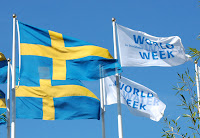 By Julia Day
By Julia Day
Here in the Swedish capital of Stockholm the 19th annual World Water Week is in full swing. Having only arrived this evening, there is a lot to catch up on ahead of the STEPS Centre session on Liquid Dynamics on Friday.
Nearly 2,500 scientists, policymakers, business leaders, NGOs and media from 136 countries have gathered here, in a city built on and around water, to discuss and exchange learning about the world’s most pressing water and sanitation issues.
Running over three years is the event’s “niche” of ‘Responding to global changes: Accessing water for the common good’. Within that niche, the special focus for 2009 is on transboundary waters.
The organiser of World Water Week, the Stockholm International Water Institute believes transboundary water systems represent a particularly complex management and policy challenges. Of all the world’s accessible freshwater, 96 per cent is located in aquifers, many of which cross national boundaries, according to the SIWI.
“If not properly managed, transboundary waters can become a source of conflict. However, through the joint dependencies of the users, those waters can also be a source of collaboration and spur regional development. Solutions need to emerge through new thinking that transcends traditional concerns about competitive access,” the event programme states.
It is new thinking that this whole event is aiming to draw out. And with more than one billion people lacking access to safe, clean drinking water, 2.6 billion lacking access to adequate sanitation and 6,000 babies dying every day from waterbourne diseases, new thinking is desperately needed.
But there remains a big disconnect between the gloabl rhetoric and the everyday realities of poor and marginalised people who have to live with the devastation wrought by lack of access to clean water and adequate sanitation.
One of the targets of Millennium Development Goal seven is to halve the proportion of people living without access to water and sanitation by 2015. But the target on sanitation is way off-track. In sub-Saharan Africa, at the current rate of progress, it will not be met until 2076 – 61 years late, according to charity WaterAid.
Earlier this week the International Water Management Institute and the United Nations Food and Agriculture Organization (FAO) have warned that Asia must reform its water use to feed 1.5 billion extra people by 2050. A sobering thought.